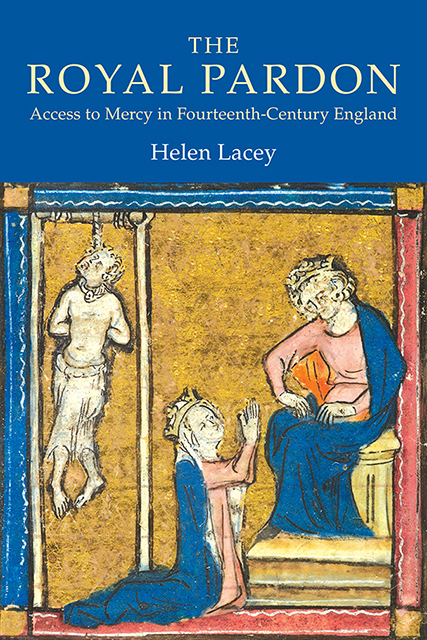Chapter Eleven - Conclusion: Attitudes to Pardoning
Published online by Cambridge University Press: 07 March 2023
Summary
This study has been predicated on the notion that the role of the pardon in fourteenth-century England deserves further attention, and that it is a subject uniquely suited to uniting much of the new work on the legal, political and cultural contexts of the later Middle Ages. Since Naomi Hurnard’s study of pardoning was published in 1969, work on the use of the pardon in the eighteenth century and the renewed interest of historians in medieval political culture has provided an entirely new context and methodology through which to view the role of the royal pardon. In the 1970s the ‘Warwick school’ of historians, including Thompson and Hay among others, led the way in demonstrating how the use of the pardon should be understood in the light of a more general perception of the law as a malleable tool of the propertied classes. Pardon might provide welcome leniency in the strictures of the law, but it was a leniency that was bestowed at the discretion of judges and monarchs, rather than accorded as of right, according to a transparent legal code. It therefore reinforced the view of the dispensation of mercy as a paternalistic act that would uphold the prevailing social hierarchy. These lessons have been heeded in more recent work, although scholars over the last twenty years have been keen to accord a greater role to individual agency in shaping people's experience of the law and the system of pardoning in particular. For those who played an active part in the political community at least, historians have demonstrated the degree to which they were able to use and adapt the language of pardon to suit their own purposes.
Similarly, the work on later medieval political culture since the 1960s has provided an entirely new context for understanding the dispensation of royal mercy. This work has offered new insight into the way in which historians should interpret medieval prescriptive texts on law and kingship, and employed new methodologies to bring together a greater range of material, such as parliamentary records, petitions, vernacular literature and legal tracts, to further inform our understanding of relations between the Crown and the political community. Recent work by John Watts, Gwilym Dodd and others has also focused attention on the language of medieval politics and the common rhetorical devices that appeared in a variety of different genres of texts and were adopted by the Crown and its subjects alike.
- Type
- Chapter
- Information
- The Royal Pardon: Access to Mercy in Fourteenth-Century England , pp. 176 - 182Publisher: Boydell & BrewerPrint publication year: 2009

